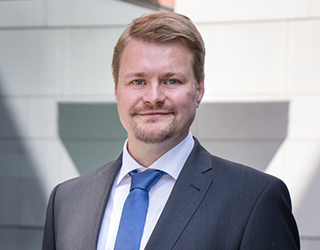Interview mit Dr. Steffen Preissler
“We must overcome this segmentation“

Dr. Steffen Preissler is head of the Fraunhofer IMW's Knowledge and Technology Transfer Division. In this interview, he explains how applied research can help small and medium-sized enterprises (SME) benefit more from international knowledge transfer.
Dear Dr. Preissler, would you please briefly explain the difference between applied research and accompanying research?
Accompanying research is more observation-based; that is the way socio-economic research was conducted in the past. Today, we conduct application-oriented social science research; that means we actually go into companies and see what could be improved there with the latest scientific findings on board.
Doesn't this tend to provoke a defensive attitude?
On the contrary, many clients from diverse science projects welcome it. Projects that have a pan-European background and involve numerous consortiums, such as the electric transport platform for example, hold specific challenges for socio-economic researchers. The more complicated the projects become, the more important such aspects as organizational development, for instance, are.
What has to happen for SMEs to benefit even more from international knowledge transfer? How do we at the Fraunhofer IMW contribute to this?
The internet lowers the threshold to information access, and therefore allows even small companies to conduct research with regard to potential candidates, ideas, markets and customers abroad at very little financial expense. However, companies often do not have the respective tools or capacities. At this point, we get involved by offering coaching, for example. We raise the SMEs' awareness of issues such as technology search and cooperation capability because in actual fact, knowledge and technology transfer frequently takes place in national or even international networks. Companies therefore have to address the issue of which knowledge and technology they want to share with whom. This aspect will become even more relevant in future.
Could you name an example of a project where these change processes were particularly successful, in your opinion?
AGENT_3D immediately comes to mind – a project that is about promoting 3D printing as a German key technology. Besides major companies, many smaller SMEs are also involved in the project consortium. Together, we discuss how we can in future integrate ourselves into value creation chains and networks that actually don't yet exist. These discussions have prompted the participating SMEs to establish strategic capacities they did not previously have. This in turn has encouraged them to develop a new language, and this process has prepared them better for the future.
How will these changes impact on business models, especially in medium-sized enterprises?
If small companies do not manage to network with each other, major companies or research institutions, they will soon lose future potential and face difficulties in the long-term. We therefore need collaborative business models; we have to overcome this segmentation, especially in small and medium-sized enterprises.
Platform business models bring consumers together with suppliers – and the agent earns a fee from each transaction. Are these business models a step in the right direction, and suitable for medium-sized enterprise knowledge transfer?
Platforms and networks force the participants to examine their own positions much more clearly. They must balance the necessity of sharing information against the desire to protect their own knowledge. Data can be exchanged much easier; collaborations can be organised much faster. That is why small and medium-sized enterprises need more expertise in order to recognise what makes economic sense for them and what doesn't. Platform models offer new opportunities for medium-sized enterprises. However, that does not mean that it will become easier.